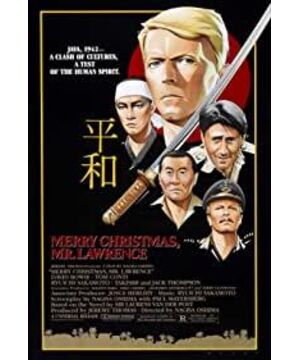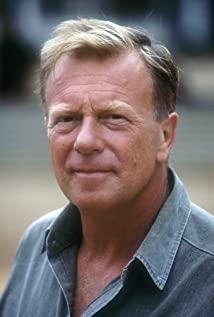Public number: tabooker
Another Christmas, when the shops on the side of the road are playing the golden hook and white lying crooked, the piano song has been haunting in my mind: Merry Christmas Mr Lawrence.
This song can be said to be the representative work of Ryuichi Sakamoto, as if it has a magic power, it will awaken the sadness in people's heart when it sounds. It first appeared in the movie "Merry Christmas Mr Lawrence/Christmas" which Ryuichi Sakamoto participated in and was responsible for the soundtrack of the same name. The film also kicks off with a low-pitched prelude in Happy Mr. Lawrence.
The Merry Christmas Mr. Lawrence movie was released in 1983 and was directed by Nagisa Oshima. The cast included the handsome David Bowie & Ryuichi Sakamoto and the fascinated Tom Kang Di (Tom Conti) & Kitano Takeshi (Takeshi Kitano).
With a legendary lineup and an interesting story, the film is Ryuichi Sakamoto's first time in the film, the first time he has contributed to the soundtrack for an entire movie, and it's also the movie where Takeshi Kitano began to make his mark on the big screen.
The film tells about the Japanese prisoner of war camp in Java in 1942 during World War II. In the whirlpool of war and violence, on the edge of life and death, under the strong conflict between the Japanese "chrysanthemum and sword" culture and Western culture, one of the two groups of officers and prisoners. The cryptic feelings between them, and the tragic stories that arise from them.
The film is based on The seed and the sower by South African author Laurens Van Der Post, which was first published in 1963 and consists of three almost unrelated stories.
The novel sets the time points as Christmas Eve/Christmas breakfast and Christmas night, from the perspective of the writer "I", through chatting with Lawerence, recalling all kinds of past events.
First Story: A bar of shadow-Christmas eve
The story was originally published as a short story in 1956. "I" and "Lawerence" meet at a bar and chat about the Java-Japanese POW camp where L was in during World War II, and his relationship with Sergeant Gengo Hara, the Japanese police officer who was in charge of the camp at the time. L has a better understanding of Japanese culture. He talked about the Japanese soldiers at that time seeking death rather than survival. They believed that death was a romantic thing. They could not understand why the prisoners of war did not commit suicide, because for them, being captured and still alive was extremely important. A big humiliation. In this paragraph, it is specifically mentioned that Japanese soldiers are more repulsive of love, and will tear up all the pages with kisses in the book. They are ashamed of human desires.
When talking about Hara, in the word L, he said that Hara was not an independent individual, and could not even be called a "person". Hara was very violent in the camp, often flogging the prisoners, and was moody and very stubborn, but Those eyes were shining. In the camp, Hara had a special feeling for Lawerence. On Christmas Eve, Hara claimed to be Santa Claus after getting drunk, and took the opportunity to save L.
After the war, Hara was captured. The night before H was sentenced, L finally received a letter and drove to the camp overnight. The two meet again, but they are already different, and the roles are switched. Hara faced death plainly, but he couldn't understand the reason for his execution. Lawerence tried to comfort "There is a way of winning by losing, a way of victory in defeat which we are going to discover", Hara said that this kind of thinking is very old Mode. They talked about that Christmas Eve, special night with special man, maybe it was the happiest night of Hara's life.
After Lawerence left, after thinking for a long time at the beach, he finally made up his mind to go back to express his feelings and do something for Hara, but when he returned to the prison, Hara had already been executed.
What a pity life.
"Must we always be too late?"
The second story: The seed and the sower-Christmas morning
This is the longest story in the novel. The first part is the diary written by Celliers in the prison camp, which tells about his relationship with his brother, the betrayal of his brother, and the guilt that the betrayal brought him throughout his life; The later part of the story is told by "I" about the relationship between Celliers and Japanese officer Yonoi in a POW camp.
Jacques Celliers, originally a South African officer serving in the British Army, only appears in the second story, and in the conversation between "I" and Lawerence, his appearance is "beautiful" among all the good-looking/acquainted Man/like an animal/oddly silent man/But he seemed to me to behave sometimes as if he wanted to get himself killed.
At the beginning of the diary, "I had a brother once and I betrayed him." This sentence also established how Celliers would die step by step. C and his brother were seven years apart, and two younger sisters between them both died at an early age.
C is very different from his younger brother, C is romantic and suave/good-looking and good-looking (repeatedly emphasized in the book)/good at learning/strong athletic ability/student leader/very popular in school, while his younger brother is very average and even a little ugly / Can't learn anything / Physically disabled / Don't know the world. But the younger brother is kind and gentle, and he rarely blames others. The younger brother is a planting genius. The flowers and plants on his farm are very beautiful under his sowing, which is where the title of the book comes from "the seed and the sower" ", one level is physical seeding, the other level is spiritual seeding, the younger brother planted the seed in C's heart with his own transparent and kind person.
Another area where my younger brother is stronger than C is his talent for singing. C is a tone-deaf. The first time I heard my younger brother sing was when I went home during the holiday and heard my younger brother sing his own songs from a distance, and I was fascinated by it.
Ride, ride through the day,
Ride through the moonlight
Ride, ride through the night
For far and I just danced
That's not far
For someone who has waiting there
The story of the betrayal happened when Celliers was in college. His younger brother also transferred over and his family hoped C could take care of him. In order to maintain his status in the school, C deliberately reduced the time he spent with his younger brother, feeling that he was embarrassing himself. After one day of class, his younger brother was violently attacked on campus, teased by the whole school, sang in public, and finally was stripped of his clothes and thrown into a puddle. Celliers chose to avoid it and turned a blind eye. Since then, the younger brother has not sung again.
And this escape, this betrayal, is one of C's sins in his life.
During the war, Celliers went home to see his brother and sister-in-law, and at a dinner at home, the younger brother sang the familiar song again.
Ride, ride through the day
Ride through the moonlight
Ride, ride through the night
For far in the distance burns the fire
For someone who has waited long.
After reading the letter, "I" and Lawerenc talked about things in the prison camp. "I" worked as an interpreter in the camp under the jurisdiction of Yoni, while Lawerence was in the camp under the jurisdiction of Hara, and had only one relationship with Yonoi. L and Celliers fought together, but the two did not communicate.
Yonoi's appearance vocabulary is the most handsome Japanese we had ever seen/priestlike face/round head/taller/straightly/tidiest Japanese officer. There are many similarities with Celliers. Both of them are responsible for their appearance and have their own personalities and standards. As soon as they met, they were attracted to each other. The most expressed in the book is Yonoi's care and love for Celliers. Y placed the weak C on the bench and brought C to his camp, ordering the doctor to cure C as soon as possible. And I come to visit every night, taking advantage of the moonlight to stand in the distance to watch Celliers secretly, and it will take a long time to leave, and I will ask "I" about C's status every day. Even, in the most intense and special kiss scene, Yonoi's eyes kept on Celliers' face.
Celliers said something like "I guess Yonoi and I were birds of a feather caught in the same trap of our own bright plumage. He too was a fugitive from his own inner law - just as I was: talk about loyalty to the old school tie. It's not a patch on the loyalty of the old Borstal knot", illustrating why the two admire each other.
I don't know if I like Ryuichi Sakamoto too much or for other reasons. It's fine when I watch a movie, but when I read a book, I find the character Celliers very unpleasant. He has been emphasizing that he is good-looking, others like him because of his face, he is very complacent, and later he says that he is trapped by his appearance (too Versailles!) , slammed, many actions looked like I was going to do it, and you were not willing to kill me, and felt that he was desperate for death.
If it is really asking for death, then the reason must be disgust for oneself, disgust for one's own beauty/one's betrayal/one's cowardice/one's love for the same sex.
In the end, Celliers deserved to die, but I feel sorry for Yonoi.
In the square where thousands gathered, to stop Yonoi from slaughtering an officer, Celliers stepped forward, said something to Yonoi, and kissed him on the cheek, and these two men kissed in public, at the time For Japanese who believe in the spirit of Japanese militarism, it is completely unacceptable and a great personal insult. Y was immediately transferred to a prison camp for women.
Celliers was buried alive in the square, like a seed.
That kiss killed Celliers and awakened Yonoi's "humanity". One night, Yonoi returned to the square, carefully took out her scissors, and cut a strand of blonde hair from the dying Celliers' head, which she kept close to her body. The relationship between Yonoi and Lawrence is also about this hair. After Yonoi was captured, knowing that L could speak Japanese in the camp, he asked him to send Celliers' hair to a Japanese shrine. Later, Yonoi was pardoned and released from prison, L returned his hair to Yonoi, and Y wrote back and said to put that strand of soul in a place with beautiful scenery and mountains and water. A poem is attached.
In the spring,
Obeying the August spirits,
I went to fight the enemy.
In the fall,
Returning I beg the spirits,
To receive also the enemy.
It's hard to find a confidant, and it's hard to find information, so what?
“They were two of a kind”
The third story: The sword and the doll-Christmas night
At this point in the novel, a female character finally appears, and he is "I"'s wife. My wife began to join the conversation, first of all, she talked about children's education, whether weapon toys would bring war, and so on.
Then, the topic women like to talk about is other women. So, this part of the story focuses on guiding Lawerence to reminisce about his brief affair with a woman he doesn't know his name. The two of them met shortly before Lawrence was captured by the Japanese, and after the war Lawrence searched everywhere but could not find it.
Back to movies.
I believe that most people have seen the movie but have not read the original book. The most popular CPs are Yonoi and Celliers. They are "handsome and handsome. After meeting, it was life and death, but Qingqing's life was ruined because of a kiss." I don't know how many people shed tears. If the movie is released 30 years later, the two of them should become well-known CPs, and they will receive countless screams.
Similarly, I also watched the movie first and then read the original book. The movie combined and simplified the content of the book.
1/ The "I" was removed from the movie and merged into "Lawerence". Concentrating the conflict and two couples of officers & prisoners in an ambiguous relationship in one prison camp exacerbated the whole conflict. In the book Lawerence and Celliers are not in a prison camp, and the two are just comrades in arms and have no verbal communication. Lawerence and Hara are in a prison camp, Celliers and Yonoi and "I" are in a prison camp, and Hara and Yonoi are in charge of different There is no direct subordinate relationship.
2/ The movie compresses the third story in the book and the betrayal of the younger brother in the second story into fragments. It happened before Lawerence was about to be executed on Christmas Eve. remember. Hara saves Lawerence's life by freeing Celliers.
3/ There is no plot of Yonoi's subordinates to assassinate Celliers, and there is no Celliers to save Lawerence.
4/ The chorus in the movie is an added part. The singing represents Celliers' will and spirit. The singing in the book only exists in Celliers' mind.
5/In the movie, the content of the Korean sergeant jq Swiss soldier's belly planing is new, and the content of Hara and Lawerence talking about homosexuality is new.
6/ There are some incomprehensible things in the movie, the motives of some actions, you will find the answer in the book.
Looking back on the past, we will find that the world has really changed rapidly, but some prejudices have remained unchanged, and some estrangements still cannot be lifted.
Marry Christmas.
Please see the picture version ↓
——————
If you like my text, then move your little finger to pay attention!
There are prizes for participating in the interaction, and book friends who also like to read the original film and television are welcome to communicate and contribute!
View more about Merry Christmas Mr. Lawrence reviews











